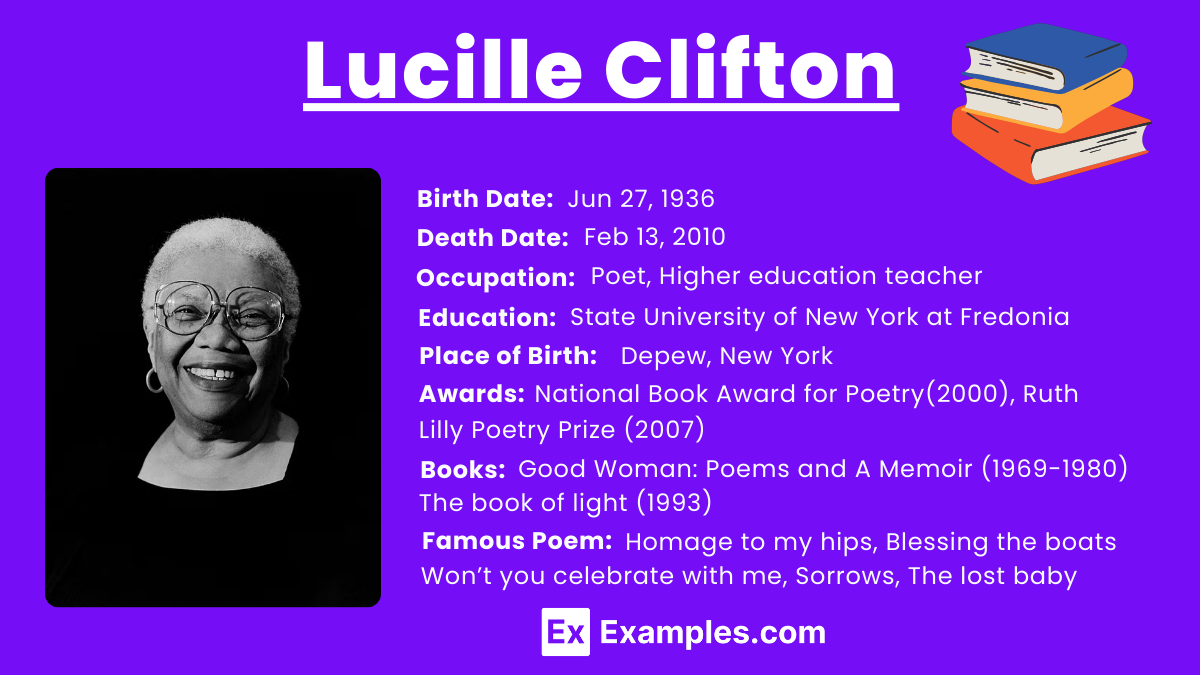Lucille Clifton
Introduction of Lucille Clifton (1936 – 2010) :
Lucille Clifton (1936-2010) was an acclaimed American poet and writer known for her poignant and powerful works that often explored themes of African American identity, family, and resilience. Born in Depew, New York, and raised in Buffalo, Clifton’s poetry is celebrated for its economy of language and its emotional depth, reflecting her personal experiences and the broader African American experience. Her numerous accolades include the National Book Award for Poetry and the Ruth Lilly Poetry Prize. Clifton’s work is notable for its accessibility and profound impact, making her a significant voice in contemporary American literature.
Famous Poems by Lucille Clifton
these hips are big hips
they need space to
move around in. …….
may the tide
that is entering even now
the lip of our understanding …..
3. won’t you celebrate with me
won’t you celebrate with me
what i have shaped into
a kind of life? i had no model. …….
the time i dropped your almost body down
down to meet the waters under the city
and run one with the sewage to the sea …..
5. Sorrows
who would believe them winged
who would believe they could be
beautiful who would believe …….
Lucille Clifton Biography
Early Life and Education
Lucille Clifton was born Thelma Lucille Sayles on June 27, 1936, in Depew, New York, and grew up in Buffalo. She was the daughter of Samuel L. Sayles, a steelworker and laborer, and Thelma Moore Sayles, who worked in a laundry. Clifton’s upbringing in a working-class African American family deeply influenced her poetry. Her parents, despite limited formal education, instilled in her a love for storytelling and literature.
Career Beginnings
Clifton attended Howard University from 1953 to 1955 and later graduated from the State University of New York at Fredonia (then Fredonia State Teachers College). Her career began in the 1960s when she worked for the New York State Division of Employment and the Office of Education in Washington, D.C. In 1969, Clifton’s first poetry collection, “Good Times,” was published, which was quickly recognized as one of the best books of the year by The New York Times.
Major Works
Clifton’s poetry is known for its spare, unadorned style, yet it carries profound emotional and intellectual weight. Her major works include:
- Good Times (1969)
- Good News About the Earth (1972)
- Two-Headed Woman (1980)
- Next: New Poems (1987)
- Blessing the Boats: New and Selected Poems 1988-2000
Achievements and Awards
- National Book Award for Poetry: For “Blessing the Boats” (2000).
- Ruth Lilly Poetry Prize: For lifetime achievement (2007).
- Emmy Award: For her work with “Free to Be… You and Me” (1974).
- Nomination for the Pulitzer Prize: For “Good Woman: Poems and a Memoir: 1969–1980” and “Next: New Poems”.
Personal Life
Lucille Clifton married Fred James Clifton, a philosophy professor at the University of Buffalo, in 1958. They had six children. Her experiences as a wife and mother often influenced her writing. Despite facing numerous personal challenges, including battles with cancer and the death of her husband in 1984, Clifton’s work remained vibrant and life-affirming.
How did Lucille Clifton Die
Lucille Clifton passed away on February 13, 2010, due to complications from a long battle with cancer. She had previously been diagnosed with breast cancer and later developed other health issues, including kidney failure. Despite her health struggles, Clifton continued to write and inspire through her poetry until her final days, leaving a lasting legacy in the world of literature.



